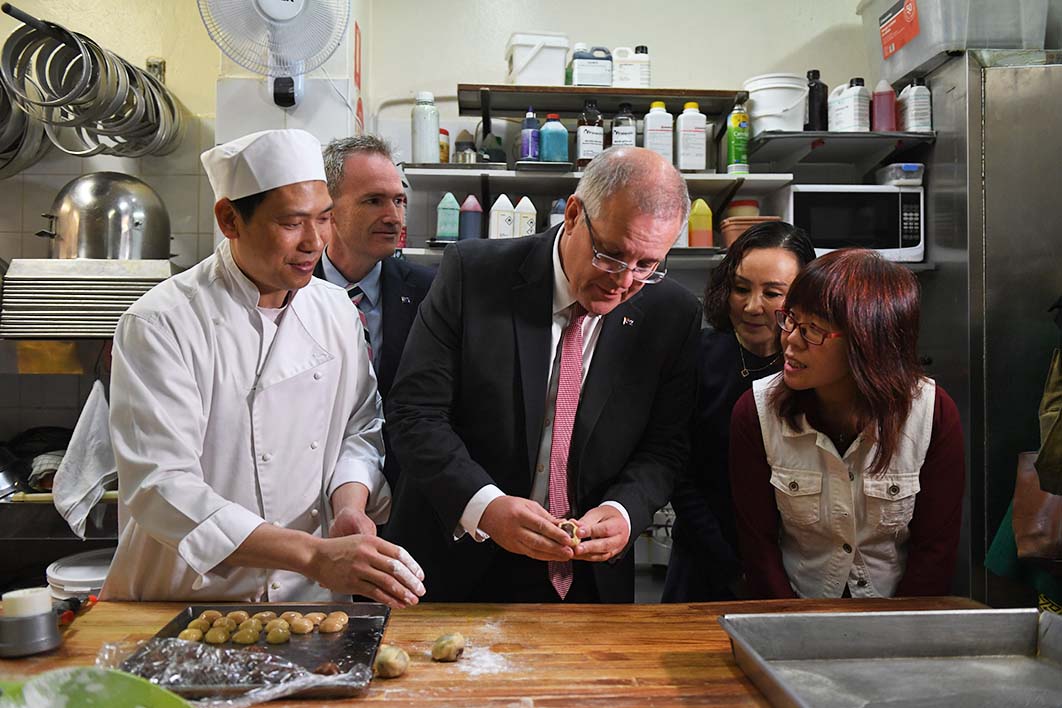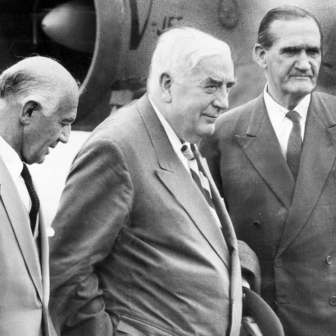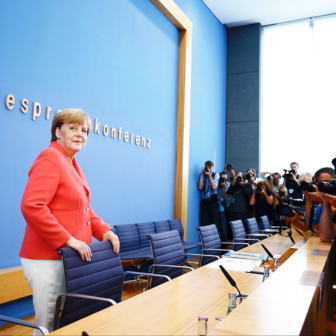Scott Morrison and his predecessor, Malcolm Turnbull, have often reminded us that Australia is the world’s most successful multicultural nation. And they have good reasons for saying so. With over 28 per cent of us born overseas and around 50 per cent having at least one overseas-born parent, we are indeed a country of immigrants — far more so than the United States, Canada, New Zealand and other settler nations.
Because of immigration, Australia is one of the youngest developed nations on the planet. Our median age of only thirty-seven is significantly lower than the OECD average of well over forty. If immigration is maintained at around current levels, Australia will maintain that youth advantage even though our population will continue to age, particularly over the next twenty years.
The fact that migrants to Australia come from many different countries is also a good thing. And — Cronulla riots notwithstanding — we are a socially cohesive society. New arrivals have been remarkably successful in so many ways.
But is it enough for the prime minister simply to keep saying we are the world’s most successful multicultural nation? In the face of rising global anti-immigration sentiment, can Australia sit back and assume we will be immune to xenophobic forces? The rise of white supremacist and neo-Nazi groups should be a warning sign, but will our government take it seriously? Remember how, when the head of Australia’s home affairs department, Mike Pezzullo, gave a speech just before the Christchurch massacre, he didn’t list right-wing extremism among the seven major threats facing Australia.
Australia became the world’s most successful multicultural nation not by accident or good luck but because we have followed the right set of policy principles since the second world war. Australia’s leaders need to understand those principles and continue to stress their importance to the public.
Since prime minister Ben Chifley and immigration minister Arthur Calwell launched Australia’s postwar migration program, Australia has used immigration to build the nation, manage demographic transitions and strengthen the economy. Over the intervening seventy years, political leaders have explained their immigration policy directions in a broad demographic, economic and social context.
The next intergenerational report, due next year, gives the government an opportunity to again talk about immigration in terms of our long-term future. It must use that chance to produce a much more sophisticated analysis than the “population plan” it issued earlier this year, which was essentially a marketing exercise. With the creation of a new population unit in Treasury, it’s to be hoped we will see more realistic assumptions about population growth and net overseas migration than those used in this year’s federal budget.
It would be good if the government also explained the basis of those assumptions so we can all understand the direction of policy. And it should resume setting migration program targets rather than using a ceiling, which is a surreptitious way of enabling home affairs minister Peter Dutton to cut the migration program without having to find associated budget savings.
Our approach to immigration has descended into tactical responses to perceived political problems, the latest crisis or administrative bungles — and there have certainly been a lot of those lately. Or, worse still, immigration has been used to whip up fears about African gangs, an invasion by “boat people” and the spectre of open borders. The government has become obsessed with keeping a relatively small number of people on Manus and Nauru, and a family of four on Christmas Island, and restricting other boat arrivals to temporary protection visas, all for purely political advantage.
Given that the government’s turn-back policy remains in place, there is no evidence these actions are contributing in any way to “stopping the boats.” The financial and human costs of indefinite detention, and of indefinitely keeping people on temporary protection visas here in Australia, have been massive — and even the political benefits are questionable.
The debate about the medivac legislation should not even be taking place. The people in offshore detention should have been resettled years ago, just as in a previous era prime minister John Howard and immigration minister Philip Ruddock managed to resettle people without boat arrivals resuming.
But the biggest immigration policy challenge we face is wage theft and the exploitation of migrant workers. Hardly a day goes by when we don’t hear about wage theft more generally. And we all know immigrants are worst affected by wage theft and worker exploitation.
The government’s recent initiatives will only make this worse. The new regional visas and the Designated Area Migration Agreements, which give the employer almost total control over a migrant’s future, will increase the level of exploitation. The state/territory-sponsored provisional visa will require its holder to live in regional Australia and work in a skilled occupation that earns a minimum of $53,900 per annum. While that pay level may be realistic in Sydney and Melbourne, it is very hard to get in regional Australia.
Many of these provisional visa holders risk being exploited by employers because of their vulnerable situation, or remaining in immigration limbo until their five-year visa expires. They will then have to go home or become overstayers after possibly five to ten years of working and paying taxes in Australia.
The government also downplays the labour scams that bring tens of thousands of people to Australia on visitor visas with the intention of applying for asylum.
In combination, these policies will see the development of a permanent and growing underclass of exploited migrant workers. While such an underclass has been a feature in the United States, Europe, Saudi Arabia and the United Arab Emirates, Australian governments of the past have tried very hard to avoid its development here.
No more, though. The current government seems quite happy to allow these scams to flourish despite its strong border-protection rhetoric.
From an immigration policy perspective, this is the one to watch. Will government take substantive action against wage theft in general, and the exploitation of migrant workers in particular? Or will Australia get a permanent underclass of its own?
Then there’s the problem of dodgy private vocational and employment training colleges. Given that governments have introduced increasingly extensive legislative and administrative arrangements to deal with this problem since the 1980s, you would think it was behind us. Not so, it appears. The Australian Skills Quality Agency registered hundreds of private VET colleges in the period 2014–17 and then, from 2018, had to cancel the registrations of hundreds of them. And yet we have seen a resurgence of media revelations in recent weeks.
This latest bout started in around 2013, when the immigration department decided it would progressively devolve responsibility for checking key student visa requirements to individual educational institutions. The result was a tremendous increase in overseas student numbers. Many had entered on the basis of undertaking a higher education course and then transferred to private VET colleges. Now we have tens of thousands of overseas students and temporary graduates in Australia with questionable qualifications from private providers that have had their registration cancelled.
The federal government, state/territory governments, skills-assessing bodies and employers will find it very hard to work out which overseas student has a genuine VET qualification and which has a qualification of little merit. The impact on the reputation of Australia’s international education industry, our third-largest export industry, will be severe, as will the impact on the students themselves and on honest VET providers.
Although Australia has long had a relatively tight policy on family reunions, parliament has consistently voted against giving governments the power to limit the number of spouse and dependent child visas. Yet the current government has decided to ignore the will of parliament and limit the number of these visas anyway.
The backlog of partner visa applications is now well over 80,000, with a two-year average processing time following an application fee of almost $8000.
Essentially the government is saying that if you marry someone from overseas, the two of you should settle in some other country. Amazingly, Australia’s migrant communities are not calling out the government. But it is time for the auditor-general’s office to investigate this abuse of power. And at the same time, it might also look into the set-aside rate for partner visas — the percentage of appeals that are successful — which has climbed to 59 per cent. Not only is the department taking forever to process partner visas at an exorbitant cost, but it can’t even get the decision-making right.
A go-slow approach also applies in citizenship processing. The government has never pointed to any research that suggests delaying access to citizenship is good public policy — that’s because there is no such research. The fact that Pauline Hanson wants the government to delay access to citizenship even more says everything you need to know about this policy.
The auditor-general has made it abundantly clear that citizenship applications have actually become easier to process as more are being lodged decision-ready. A large and growing portion of Australia’s migrants have been in Australia as temporary residents, and that means authorities hold more information about them than ever before.
And if the government says it can do character and security checks on applicants for the new Global Talent Initiative within weeks, there is absolutely no good reason for citizenship applications to take a year to process.
The auditor-general found that the delays in processing citizenship applications are largely due to applications sitting for long periods without the appointment of a processing officer. The government needs to remember that helping new migrants to become citizens as quickly as possible has been a core part of Australia’s success as a multicultural nation. Allowing new migrants to declare their loyalty to Australia is central to social cohesion. Menzies understood that. Holt understood it. Whitlam, Fraser, Hawke and Keating understood it.
It is important, of course, to help new migrants learn English and secure employment — but you don’t do that by depriving them of access to citizenship. You do that by funding English-language courses and delivering them in the right way and in the right circumstances.
The government also needs to look at better ways of helping new migrants secure employment than the currently failing Job Network system. The system has been a costly disaster — but its biggest failing is with new migrants. In particular, Job Network providers will never find it profitable to help humanitarian entrants to secure employment.
Finally, I want to come to an issue that may sound a bit arcane but will affect migrant communities in a very significant way. This is the privatisation of Australia’s global visa-processing platform.
The platform used to process visa applications is central to the management of immigration. Put simply, we can’t manage immigration without it. The plan for the next version to be developed and owned — yes, owned — by a private company means the government will effectively be beholden to an external, private organisation.
How will that company make money? In the first instance, all application fees will rise by $35. But it won’t stop there. Further increases will be as inevitable as increases in health insurance premiums. But the most serious issues will arise if the private company is allowed to introduce a premium service stream — one where the applicant pays a much larger fee for faster processing and — wink, wink, nudge, nudge — better outcomes. In these circumstances, the private company won’t be able to make extra money if it can’t convince applicants of a likely better outcome from the premium stream.
The private company will also have access to some of the most sensitive data about the private lives of Australia’s immigrants, and their Australian sponsors, an absolute treasure trove that can be used for marketing purposes.
It’s amazing that any government that cares about strong borders, immigration integrity and maintaining confidence in immigration would be taking the risk of privatising the global visa-processing platform. •
This article is based on Abul Rizvi’s speech, “Current Challenges in Immigration Policy,” to the NSW Multicultural Communities Council earlier this week.




